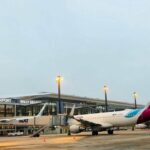Airbus and Boeing are expanding their search for engineers in India to meet booming demand for aircraft and expand their presence in the country, one of the largest economies globally, according to a Bloomberg report.
In recent months, airlines and lessors have started to use their right to compensation as a bargaining chip for the constant delays in the delivery of commercial aircraft by the two companies.
See also: Industry unrest over Airbus and Boeing delays
Airbus and Boeing are looking for talent
The world’s two largest aerospace manufacturers are looking to source skilled – and cheap – labour in an Asian country, which is trying to position itself as a manufacturing base. With around 1.5 million new engineers graduating each year in India, both companies see it as a source of English-speaking and available talent.
According to Bloomberg, Airbus plans to hire more than a thousand new employees in India during 2023, out of a total of 13.000 new workers the European manufacturer would hire worldwide. The company currently employs more than 700 people at its Bangalore centre and more than a hundred in customer service areas in New Delhi.
Moreover, Boeing and its suppliers plan to increase their workforce in India. They currently employ about 18.000 people and have hired about 1.500 per year in the recent past. It is the second country in the world with the most employees of the American manufacturer after the United States itself. It is important to note that a worker in India represents a derisory cost to the company compared to what an employee in Seattle demands.
Last week it was announced that Boeing would strengthen its presence in the country by setting up a plant to convert 737 aircraft into freighters. The company’s investment in India exceeds one billion dollars a year, with a growing presence in its economy following the signing of various agreements.
India’s potential and importance
Compared to China, Airbus and Boeing see India as an interesting alternative for the establishment of new production sites, not only because of the above but also because of the reduced geopolitical tension with the West.
Guillaume Faury, CEO of Airbus, said it was time for India to become an international centre of reference for aircraft manufacturing and assured the country was well on its way to achieving this.
India has a long history of outsourcing workers to large international companies, thanks to its availability of talent and cheap labour. The country is home to a large share of employees providing support in technology and information areas. Recently, higher-skilled jobs in various sectors of multinational companies have been on the rise.
Indian Prime Minister Narendra Modi has stated that the goal is to make the country the third largest airline market in the world. The current trend seems to confirm this: aviation activity and competition are intensifying. Demand for air travel, both domestic and international, is already close to pre-pandemic levels. And projections indicate that this will continue for the foreseeable future.
See also: Another mega-order in India?: Jet Airways could buy 200 aircraft














